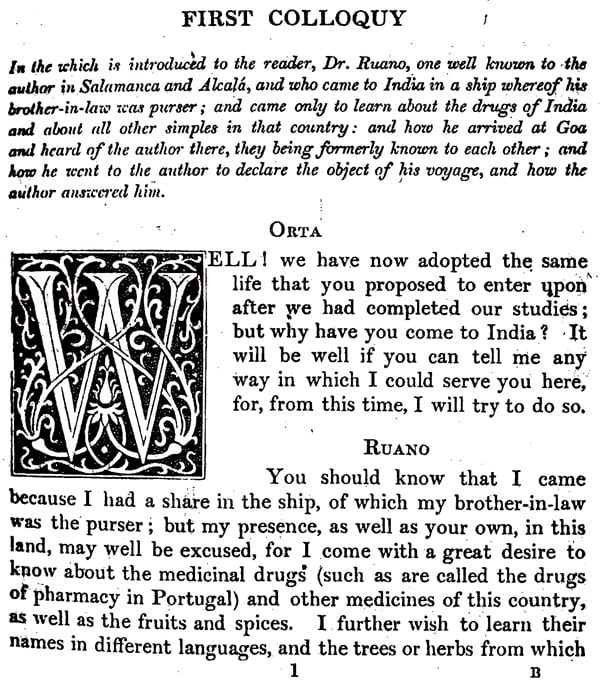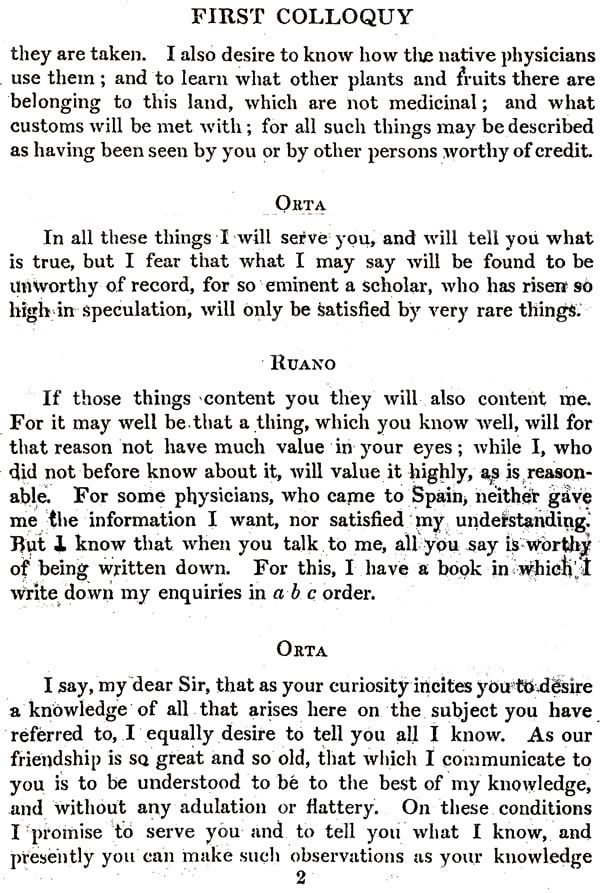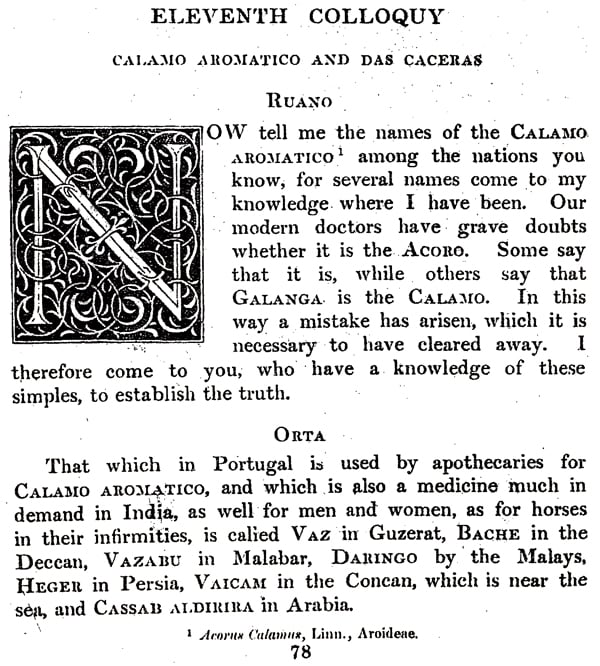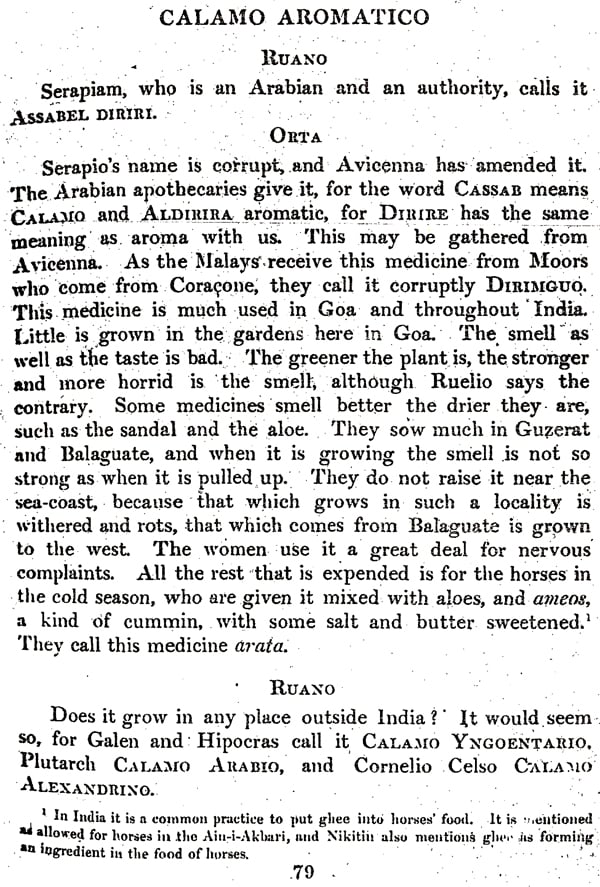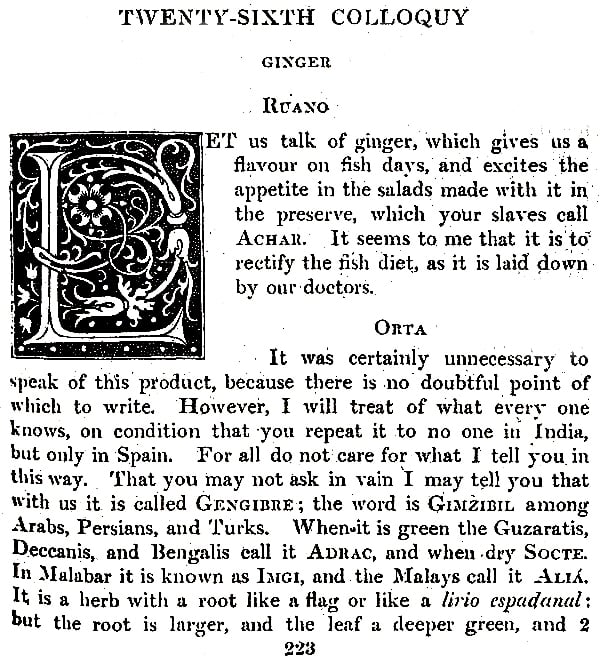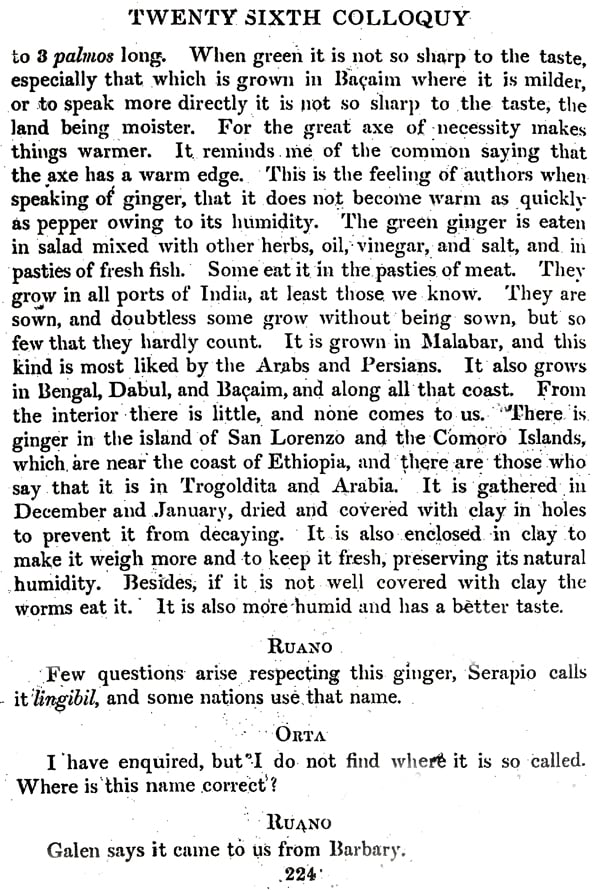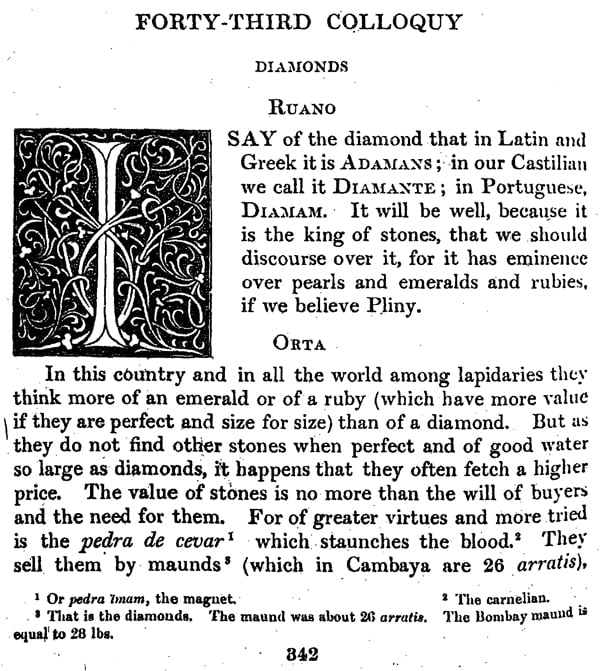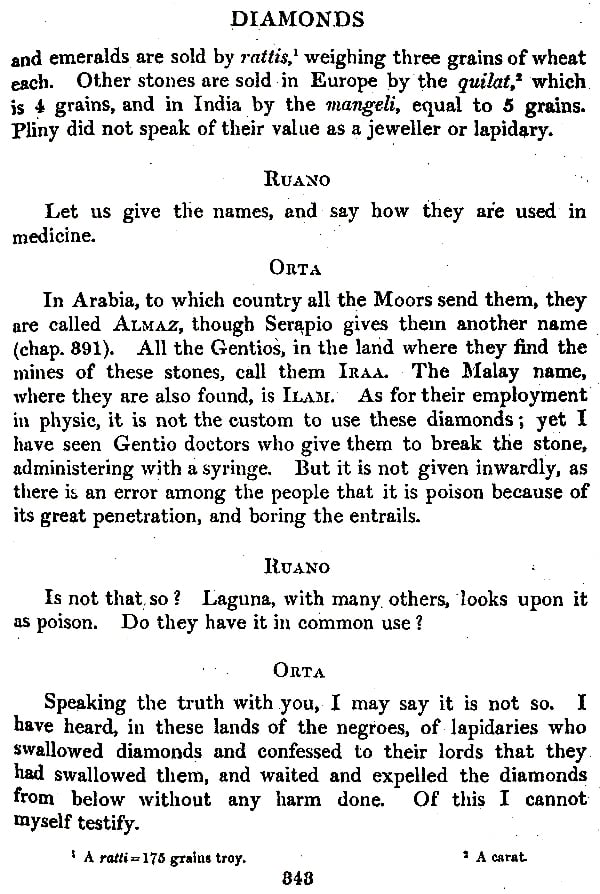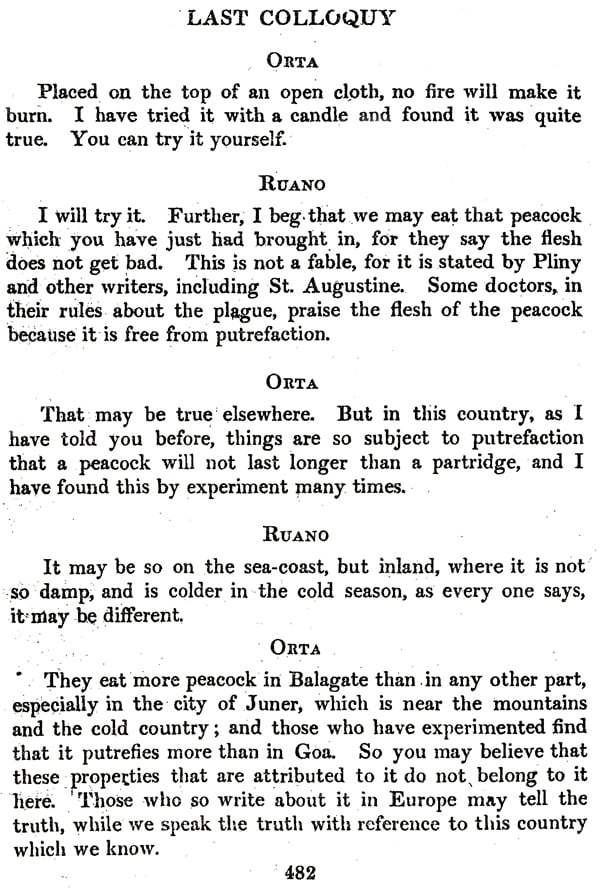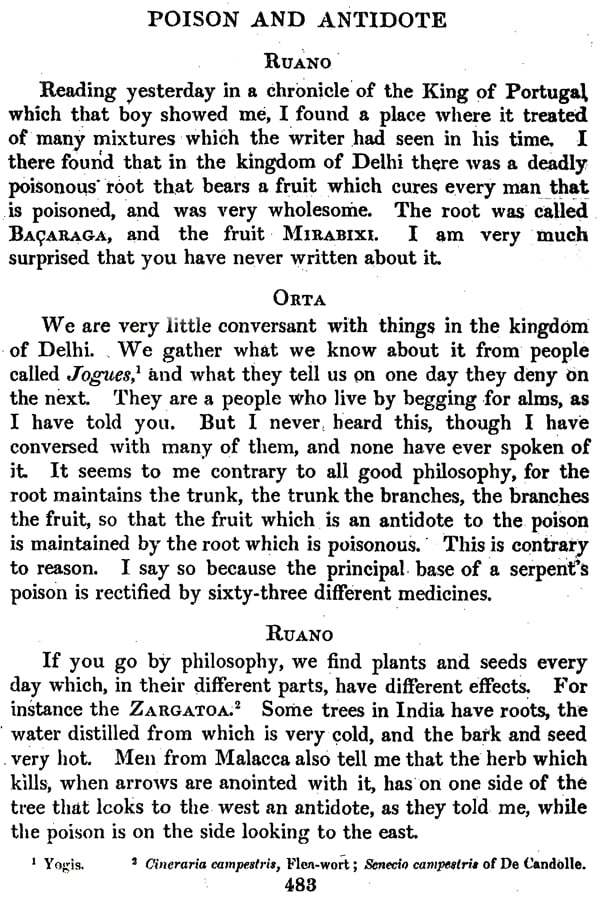
Colloquies on the Simple and Drugs of India
Book Specification
| Item Code: | NAS320 |
| Author: | G. Da Orta |
| Publisher: | Sri Satguru Publications |
| Language: | English |
| Edition: | 2016 |
| ISBN: | 8170301173 |
| Pages: | 540 |
| Cover: | HARDCOVER |
| Other Details | 8.50 X 6.00 inch |
| Weight | 700 gm |
Book Description
HE great work of Garcia da Orta on the drugs and simples of India is well known, at least by name, to all Who are interested in the botany and pharmacy of our Indian Empire. The work is interesting because it contains the first mention of many important plants, of their uses, and the first descriptions of the treatment of diseases-cholera, for instance-and of several customs and habits of the natives.
Garcia da Orta was born in about, 1490 or perhaps a few years later, at Elvas,1 so famous for its phials, pear the Spanish frontier and on the way to Badajos. His father appears:to have been an owner of houses and other .property' at Elvas, named Jorge da Orta, who, besides Garcia, had a son, Francisco of Portalegre, who, married Caterina Lopes. Francisco had a son, Jorge, nephew of Garcia da Orta, who was a surgeon, and the heir to his uncle. The elder Jorge also had a daughter, Garcia,'s sister, married to .the Bachilfer Gabriel Luis.'
In the boyhood of Garcia d'a Orta there was residing on his estate of Labruja, near Elvas, Dom Fernao de Sousa, of a noble family descended from a natural son of King Alfonso III. bra very beautiful Moor, daughter of the Cadi of Faro. The -two families were on friendly terms, and under the auspices of the Sousa family young Garcia was sent to the Spanish Universities, studying both at Salamanca and at Alcala de Henares, from 1515 to 1525.1 After his return to Portugal in 1526 he was for some years a village doctor at Castello de Vide, near his native town of Elvas. His patrons, in 1532, got him appointed lecturer in the Lisbon UniversiV, and he held that appointment from 1532 to 1534. In the latter year he undertook to go out to India as a physician with 'Martin Affbnso de Sousa, second son of the Lord of Labruja4--0 calls him his amo." The fleet of five ships left the Taus, on March 12, 1534, reaching Goa in September.
At that time Nuilo da Cunha was Governor of PortugueSe India, 1529-1538. Ile was succeeded by Garcia da Noronha as Viceroy, 1538-1540. Then followed Estevan, nephew of Vasco da Garna, 1540-1542 ; and Martin Affonso de SonSa, the friend and patron of Garcia cla Orta, was Governor from 154t to 1645. Garcia .da Orta saw a great deal of active service as physician to his friend, and became personally well acquainted with the countries bordering on the west coast of India. He was a Diu when it was ceded to the Portuguese by 13ahaur Shah; the .IKing of Cambay, and 'he accompanied Sousa in a march across Kattiawar nearly to Ahmedabad, with, the army of Bahadiir Shah. He afterwards formed a great friendship with Bahrarn Nizam Shah, whose capital was at A.hmednagar, visiting him, and acting as histphysician. Garcia da Orta also accompanied Sousa in a campaign from Cochin against the Zamorin, and in Ceylon. This seems to be the extent of his personal knowledge. He, do-es not appear to have been at Bijapur or Bijayanagar in the Deccan, though he often mentions those places, and he knew nothing of Bengal, Berar, or the kingdom of Delhi. The great physician had a house and garden with many medicinal herbs at Goa, and in about 1554 he Was granted a long lease of the island of bomby,which he sublet. His tenant was Siinan Toscano, who, with the rent, brought him presents of mangos and other fruits tO Goa. He was in practice for many years, and 'after his friend. Sousa left India he was physician to the Viceroy, Pedro Mascarenhas, 15544555. Garcia da Orta was always adding to the great amount of erudition he brought with him to India. He had a most extensive and accurate knowledge of the writings of all who had gone before him, and his sound common sense enabled him, with confidence,- to separate facts from fables. He knew personally all the plants within hiS reach from which drugs were derived. For the rest he was indefatigable in his enquiries from native physicians, and in his examinations of Yogis from the kingdom of Delhi, and of traders and others from all parts-Deccanis, Guzeratis, Bengalis, Cingalese, Moors, Persians, Arabs, and Malays.
In 1558 Dom Constantino de Braganza, the brother of the Duke, came out as Viceroy, bringing with him the licentiate Dimas Bosque as his physician. This learned person 2 became a friend of Dr. Garcia da .Orta, and it is more than probable that the old physician, who had then been practising in India for upwards of a quarter of a century, was induced by Dimas Bosque to undertake the production of a great work on the drugs and simples of his adopted country. All his friends must have_felt that his vast knowledge ought not to die with him. The ywork was finished in the time of Dom Francisco COutinho, Count. of Redondo, who was Viceroy from 1561 to 1564,1 to whom it was dedicated.. Luis Camoens; the immortal poet, was an intimate friend of Garcia da Orta at this., time. Camoens had been banished to. Macao, but he returned to Goa_ in 1561, and was._ engaged in -writing Os L2csict4os., Wilhelm Stork, in his Life of Camoens, says that the poet passed many agreeable and instructive hours in the house of Ale learned old map, admiring his collections and examining his extensive library, finding in both materials for the: last two cantos of Os Lusiados: This is quite likely, for the poet composed an ode to the Viceroy in which, after an eloquent address to the Count of Redondo, he exclaims :.-
Favoreeei a Antigua
Sciencia que ja Achilles estimou
Olhai que vos obrigua
Verdes que em vosso tempo se mostrou
0 fruto d'aquella ORTA onde florecem
Prantas novas que os loutos nao conhecenr
Olhai que em vossos annos
Produze huma own insigne varies ervas
Nos campos Lusitanos
Ai quaes aquellas doutas e protervas
Medea e Circe nunca conheceram
Posta que as leis da Magica excederam
E vede carreguado
Deannos, letras, e longue experiencia
Hum velho que insinado
Das gangeticas Muses na sciencia
Podaliria subtil e arte syluestre
Vence o velho Chiron de Achilles mestre.
** Sample Pages**
